Blog - Foot Doctor, Chambersburg and McConnellsburg, PA
Causes and Types of Non-Diabetic Foot Neuropathy
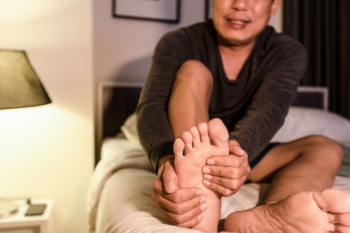
Non-diabetic foot neuropathy refers to nerve damage in the feet that occurs without a connection to diabetes. This type of neuropathy can result from vitamin deficiencies, autoimmune diseases, infections, and exposure to toxins. Chronic alcohol use, certain medications, and hereditary conditions may also contribute to nerve damage. Peripheral neuropathy affects the sensory and motor nerves, resulting in numbness, tingling, and muscle weakness. Autonomic neuropathy impacts involuntary functions, sometimes causing abnormal sweating, temperature regulation issues, or changes in blood flow to the feet. Additionally, focal neuropathy occurs suddenly and affects a specific nerve, often leading to sharp pain or weakness in a localized area. If any of the above symptoms affect your feet or ankles, it is strongly suggested that you are under the care of a podiatrist who can help you to manage this condition.
Neuropathy
Neuropathy can be a potentially serious condition, especially if it is left undiagnosed. If you have any concerns that you may be experiencing nerve loss in your feet, consult with Dr. Steven Schwartz from Pennsylvania. Our doctor will assess your condition and provide you with quality foot and ankle treatment for neuropathy.
What Is Neuropathy?
Neuropathy is a condition that leads to damage to the nerves in the body. Peripheral neuropathy, or neuropathy that affects your peripheral nervous system, usually occurs in the feet. Neuropathy can be triggered by a number of different causes. Such causes include diabetes, infections, cancers, disorders, and toxic substances.
Symptoms of Neuropathy Include:
- Numbness
- Sensation loss
- Prickling and tingling sensations
- Throbbing, freezing, burning pains
- Muscle weakness
Those with diabetes are at serious risk due to being unable to feel an ulcer on their feet. Diabetics usually also suffer from poor blood circulation. This can lead to the wound not healing, infections occurring, and the limb may have to be amputated.
Treatment
To treat neuropathy in the foot, podiatrists will first diagnose the cause of the neuropathy. Figuring out the underlying cause of the neuropathy will allow the podiatrist to prescribe the best treatment, whether it be caused by diabetes, toxic substance exposure, infection, etc. If the nerve has not died, then it’s possible that sensation may be able to return to the foot.
Pain medication may be issued for pain. Electrical nerve stimulation can be used to stimulate nerves. If the neuropathy is caused from pressure on the nerves, then surgery may be necessary.
If you have any questions, please feel free to contact our offices located in Chambersburg, and Mcconnellsburg, PA . We offer the newest diagnostic and treatment technologies for all your foot care needs.
Why Do People Get Bunions?
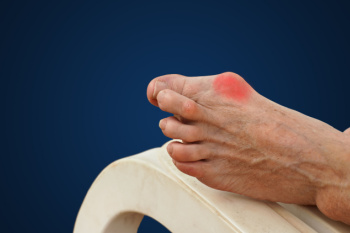
Bunions are a common foot problem that causes a bump to form at the base of the big toe. They happen when the bones in the front of your foot shift out of place, making the big toe lean toward the second toe. This can cause pain, swelling, and difficulty finding comfortable shoes. Many people get bunions because of the shape of their feet, which they inherit from their family. Wearing tight, narrow, or high-heeled shoes can make bunions worse. Other causes include flat feet, arthritis, and foot injuries. Bunions can get worse over time, if not treated. Early treatment, like wearing wider shoes or using custom orthotics, can help relieve discomfort and slow the bunion’s progression. If you notice a bump forming or feel pain in your big toe joint, it is suggested that you see a podiatrist for relief options.
If you are suffering from bunion pain, contact Dr. Steven Schwartz of Pennsylvania. Our doctor can provide the care you need to keep you pain-free and on your feet.
What Is a Bunion?
Bunions are painful bony bumps that usually develop on the inside of the foot at the joint of the big toe. As the deformity increases over time, it may become painful to walk and wear shoes. Women are more likely to exacerbate existing bunions since they often wear tight, narrow shoes that shift their toes together. Bunion pain can be relieved by wearing wider shoes with enough room for the toes.
Causes
- Genetics – some people inherit feet that are more prone to bunion development
- Inflammatory Conditions - rheumatoid arthritis and polio may cause bunion development
Symptoms
- Redness and inflammation
- Pain and tenderness
- Callus or corns on the bump
- Restricted motion in the big toe
In order to diagnose your bunion, your podiatrist may ask about your medical history, symptoms, and general health. Your doctor might also order an x-ray to take a closer look at your feet. Nonsurgical treatment options include orthotics, padding, icing, changes in footwear, and medication. If nonsurgical treatments don’t alleviate your bunion pain, surgery may be necessary.
If you have any questions, please feel free to contact our offices located in Chambersburg, and Mcconnellsburg, PA . We offer the newest diagnostic and treatment technologies for all your foot care needs.
What Your Feet Can Reveal About Your Health
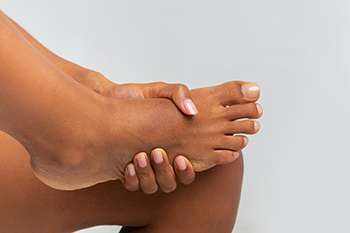
The condition of your feet can provide important clues about your overall health. Cold feet may indicate poor circulation, which can be a sign of conditions like peripheral artery disease or diabetes. Persistent foot pain that does not improve with rest may suggest arthritis, nerve damage, or an underlying structural issue. Changes in the nails, including discoloration, thickening, or brittleness, can be linked to fungal infections, nutritional deficiencies, or even thyroid disorders. Additionally, burning foot pain may be a symptom of nerve damage, often associated with diabetes or vitamin B deficiency. Paying attention to these signs and seeking medical advice when necessary can help detect health issues early. If you have any type of foot pain, it is suggested that you consult a podiatrist who can treat various foot conditions, and determine if it is an indicator of additional health issues.
When dealing with systemic disease of the feet, it is extremely important to check the affected areas routinely so that any additional problems are caught quickly. If you have any concerns about your feet and ankles contact Dr. Steven Schwartz from Pennsylvania. Our doctor will assist you with all of your podiatric needs.
Systemic Diseases of the Feet
Systemic diseases affect the whole body, and symptoms usually are displayed in the feet. This condition can make a patient’s ability to walk unbearable. Systemic diseases include gout, diabetes mellitus, neurological disorders, and arthritis.
Gout – is caused by an excess of uric acid in the body. Common symptoms include pain, inflammation, and redness at the metatarsal/phalangeal joint of the base big toe. Gout can be treated by NSAIDs to relieve pain and inflammation, and other drugs that lower the acid levels in the body.
Diabetes mellitus – is an increase in the level of blood sugar that the body cannot counteract with its own insulin. Failure to produce enough insulin is a factor in Diabetes.
Diabetes of the Feet
Diabetic Neuropathy – may lead to damaged nerves and affect the feet through numbness and loss of sensation.
Peripheral Vascular Disease – can restrict the blood flow to the feet, and often times lead to amputation of the feet.
If you have any questions please feel free to contact our offices located in Chambersburg, and Mcconnellsburg, PA . We offer the newest diagnostic and treatment technologies for all your foot and ankle needs.
Symptoms and Treatment of Fungal Toenails
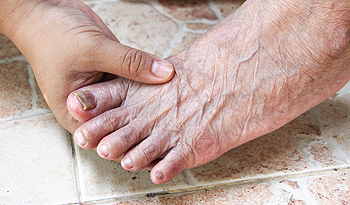
Fungal nail infections primarily affect toenails, causing them to thicken, become discolored, and occasionally separate from the nail bed. In mild cases, fungal toenail infections might not require immediate treatment, yet some patients have a higher risk of complications and should seek professional advice promptly. Risk factors include diabetes, psoriasis, peripheral arterial disease, smoking, or medications that weaken the immune system. Fungal infections typically develop from minor injuries near the nail. They can be spread by sharing personal items like nail clippers or towels, walking barefoot in moist public areas, or transferring athlete’s foot from the skin between toes to the toenails. Treatment is often challenging due to frequent recurrences, and may include prescription antifungal nail lacquers, or oral antifungal medications prescribed by a podiatrist. In severe cases, a podiatrist may recommend surgery to remove the affected nail completely. If you notice that your toenail appears infected, it is suggested that you schedule an appointment with a podiatrist for an exam, diagnosis, and treatment options.
If left untreated, toenail fungus may spread to other toenails, skin, or even fingernails. If you suspect you have toenail fungus it is important to seek treatment right away. For more information about treatment, contact Dr. Steven Schwartz of Pennsylvania. Our doctor can provide the care you need to keep you pain-free and on your feet.
Symptoms
- Warped or oddly shaped nails
- Yellowish nails
- Loose/separated nail
- Buildup of bits and pieces of nail fragments under the nail
- Brittle, broken, thickened nail
Treatment
If self-care strategies and over-the-counter medications does not help your fungus, your podiatrist may give you a prescription drug instead. Even if you find relief from your toenail fungus symptoms, you may experience a repeat infection in the future.
Prevention
In order to prevent getting toenail fungus in the future, you should always make sure to wash your feet with soap and water. After washing, it is important to dry your feet thoroughly especially in between the toes. When trimming your toenails, be sure to trim straight across instead of in a rounded shape. It is crucial not to cover up discolored nails with nail polish because that will prevent your nail from being able to “breathe”.
In some cases, surgical procedure may be needed to remove the toenail fungus. Consult with your podiatrist about the best treatment options for your case of toenail fungus.
If you have any questions, please feel free to contact our offices located in Chambersburg, and Mcconnellsburg, PA . We offer the newest diagnostic and treatment technologies for all your foot care needs.
Common Causes of Swollen Feet
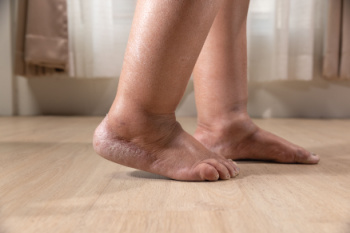
Swollen feet can be caused by several factors, often linked to underlying health conditions. One common cause is leaky veins, where blood flows backward due to weakened valves, leading to fluid buildup in the lower limbs. This condition, known as venous insufficiency, is often accompanied by discomfort and swelling. Another factor to consider is the side effects of medication. Certain drugs, such as those used for high blood pressure or diabetes, can cause fluid retention, leading to swelling in the feet. Dependent edema is another possible cause, particularly for individuals who spend prolonged periods standing or sitting. This condition results from gravity pulling fluid into the lower extremities. Lastly, inflammation due to injury, infection, or conditions like arthritis can cause swelling in the feet. If you have swollen feet, it is suggested that you consult a podiatrist who can determine what the reason is, and offer effective relief and treatment tips.
Swollen feet can be a sign of an underlying condition. If you have any concerns, contact Dr. Steven Schwartz of Pennsylvania. Our doctor can provide the care you need to keep you pain-free and on your feet.
Swollen feet are a common ailment among pregnant women and people who stand or sit for extended periods. Aging may increase the possibility of swollen feet and patients who are obese often notice when their feet are swelling too. There may be medical reasons why swollen feet occur:
- Phlebitis - A condition that causes the veins to become inflamed and can also cause leg pain.
- Liver disease - This may lead to low blood levels of albumin which is a protein. This can cause fluid in the blood to pass into the tissues and several areas of the body can become swollen.
- Heart failure - When the heart doesn’t pump properly the blood that is normally pumped back to the heart can pool in the veins of the legs causing swollen feet.
- Kidney disease - One of the main functions of the kidneys is releasing excess fluid in the body. This type of condition can make it difficult for the kidneys to function properly, and as a result the feet may become swollen.
- Deep-vein thrombosis (DVT)- This is a serious condition where blood clots form in the veins of the legs. They can block the return of blood from the legs to the heart which may cause the feet to swell. It is important to be treated by a podiatrist if this condition is present.
Swollen feet can also be caused by bone and tendon conditions, including fractures, arthritis, and tendinitis. Additionally, there may be skin and toenail conditions and an infection may cause the feet to swell. Patients who take medicine to treat high blood pressure may be prone to getting swollen feet.
Many patients elevate their feet to help relieve the swelling and this is generally a temporary remedy. When a podiatrist is consulted the reason behind the swelling can be uncovered and subsequently treated.
If you have any questions please feel free to contact our offices located in Chambersburg, and Mcconnellsburg, PA . We offer the newest diagnostic tools and technology to treat your foot and ankle needs.
The Perils of Occupational Footwear on Foot Health and Wound Risk
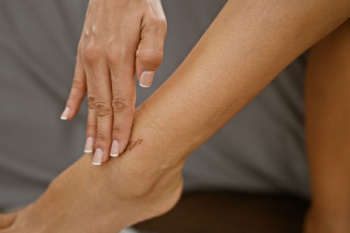
Wearing the wrong occupational footwear can lead to serious foot problems, including the risk of developing foot wounds. Ill-fitting shoes can create excessive pressure and friction, which can in turn cause painful calluses and blisters. When left untreated, these minor injuries can progress into open wounds, increasing the risk of infection. Tight footwear or poorly designed toe boxes may damage the nails, leading to bruising, thickening, or fungal infections that make the surrounding skin more vulnerable to injury. Long hours on hard surfaces in unsupportive shoes can result in plantar fasciitis, while improper cushioning and poor arch support contribute to chronic foot and ankle pain. Over time, poor circulation, especially in individuals with diabetes, can lead to ulcers and slow-healing wounds. Workers should ensure they wear well-fitted, supportive shoes to prevent foot injuries. If wounds or persistent pain develop, it is suggested that you consult a podiatrist for a proper evaluation and more appropriate footwear recommendations.
Wound care is an important part in dealing with diabetes. If you have diabetes and a foot wound or would like more information about wound care for diabetics, consult with Dr. Steven Schwartz from Pennsylvania. Our doctor will assess your condition and provide you with quality foot and ankle treatment.
What Is Wound Care?
Wound care is the practice of taking proper care of a wound. This can range from the smallest to the largest of wounds. While everyone can benefit from proper wound care, it is much more important for diabetics. Diabetics often suffer from poor blood circulation which causes wounds to heal much slower than they would in a non-diabetic.
What Is the Importance of Wound Care?
While it may not seem apparent with small ulcers on the foot, for diabetics, any size ulcer can become infected. Diabetics often also suffer from neuropathy, or nerve loss. This means they might not even feel when they have an ulcer on their foot. If the wound becomes severely infected, amputation may be necessary. Therefore, it is of the upmost importance to properly care for any and all foot wounds.
How to Care for Wounds
The best way to care for foot wounds is to prevent them. For diabetics, this means daily inspections of the feet for any signs of abnormalities or ulcers. It is also recommended to see a podiatrist several times a year for a foot inspection. If you do have an ulcer, run the wound under water to clear dirt from the wound; then apply antibiotic ointment to the wound and cover with a bandage. Bandages should be changed daily and keeping pressure off the wound is smart. It is advised to see a podiatrist, who can keep an eye on it.
If you have any questions, please feel free to contact our offices located in Chambersburg, and Mcconnellsburg, PA . We offer the newest diagnostic and treatment technologies for all your foot care needs.
Foot Pain While Ice Skating

Feet can hurt while ice skating for several reasons, with the most common being improper fitting skates. If the skates are too tight or too loose, they can cause discomfort and pain by pressing on certain areas of the foot or not providing enough support. Poorly fitted skates may lead to blisters, pinched nerves, or restricted circulation, making skating a painful experience. Another factor is the lack of cushioning or support within the skate itself. Ice skating places a lot of pressure on the feet, especially during sharp turns or jumps. Inadequate arch support or lack of padding can result in soreness or fatigue. Additionally, the stiff structure of ice skates can sometimes cause muscles and tendons in the feet to tense up, leading to discomfort. Overuse or skating for long periods without taking breaks can also contribute to foot pain. If you enjoy ice skating and have foot pain, it is suggested that you contact a podiatrist who can offer effective relief methods, in addition to tips on how to protect your feet while skating.
Ankle and foot injuries are common among athletes and in many sports. They can be caused by several problems and may be potentially serious. If you are feeling pain or think you were injured in a sporting event or when exercising, consult with Dr. Steven Schwartz from Pennsylvania. Our doctor will assess your condition and provide you with quality foot and ankle treatment.
Common Injuries
The most common injuries that occur in sporting activities include:
- Achilles Tendonitis
- Achilles Tendon Rupture
- Ankle Sprains
- Broken Foot
- Plantar Fasciitis
- Stress Fractures
- Turf Toe
Symptoms
Symptoms vary depending upon the injury and in some cases, there may be no symptoms at all. However, in most cases, some form of symptom is experienced. Pain, aching, burning, bruising, tenderness, tightness or stiffness, sensation loss, difficulty moving, and swelling are the most common symptoms.
Treatment
Just as symptoms vary depending upon the injury, so do treatment options. A common treatment method is known as the RICE method. This method involves rest, applying ice, compression and elevating the afflicted foot or ankle. If the injury appears to be more serious, surgery might be required, such as arthroscopic or reconstructive surgery. Lastly, rehabilitation or therapy might be needed to gain full functionality in the afflicted area. Any discomfort experienced by an athlete must be evaluated by a licensed, reputable medical professional.
If you have any questions, please feel free to contact our offices located in Chambersburg, and Mcconnellsburg, PA . We offer the newest diagnostic and treatment technologies for all your foot care needs.
How to Identify Gout
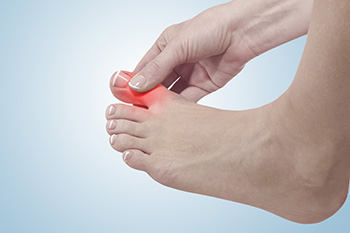
Gout is a form of arthritis that often affects the big toe, causing sudden and intense pain. It occurs when uric acid builds up in the bloodstream, forming sharp crystals in the joints. This usually happens when the body produces too much uric acid or does not excrete enough through the kidneys. Symptoms of gout in the big toe include extreme pain, swelling, redness, and warmth in the joint, typically occurring suddenly, often at night. The pain can be so intense that even the lightest touch, like the weight of a blanket, can feel unbearable. Treatment for gout involves medications to reduce inflammation and pain, such as NSAIDs, colchicine, or corticosteroids. Long-term management includes medications to lower uric acid levels and dietary changes, such as reducing alcohol and high-purine foods. A podiatrist can help manage gout, provide pain relief, and recommend lifestyle changes. If you are experiencing this condition, it is suggested that you make an appointment with a podiatrist.
Gout is a foot condition that requires certain treatment and care. If you are seeking treatment, contact Dr. Steven Schwartz from Pennsylvania. Our doctor will treat your foot and ankle needs.
What Is Gout?
Gout is a type of arthritis caused by a buildup of uric acid in the bloodstream. It often develops in the foot, especially the big toe area, although it can manifest in other parts of the body as well. Gout can make walking and standing very painful and is especially common in diabetics and the obese.
People typically get gout because of a poor diet. Genetic predisposition is also a factor. The children of parents who have had gout frequently have a chance of developing it themselves.
Gout can easily be identified by redness and inflammation of the big toe and the surrounding areas of the foot. Other symptoms include extreme fatigue, joint pain, and running high fevers. Sometimes corticosteroid drugs can be prescribed to treat gout, but the best way to combat this disease is to get more exercise and eat a better diet.
If you have any questions please feel free to contact our offices located in Chambersburg, and Mcconnellsburg, PA . We offer the newest diagnostic and treatment technologies for all your foot and ankle needs.



